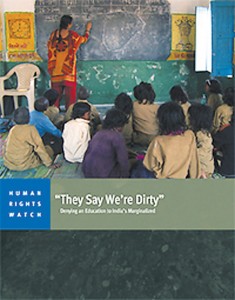Human Rights Watch Report Reveals Discrimination against Kids from Marginalized Communities.
New Delhi: “School authorities in India persistently discriminate against children from marginalized communities, denying them their right to education”, Human Rights Watch said in a report released last fortnight. Four years after an ambitious education law went into effect in India guaranteeing free schooling to every child ages 6 to 14, almost every child is enrolled, yet nearly half are likely to drop out before completing their elementary education.
The report, “‘They Say We’re Dirty’: Denying an Education to India’s Marginalized,” documents discrimination by school authorities in four Indian states against Dalit, tribal, and Muslim children. The discrimination creates an unwelcome atmosphere that can lead to truancy and eventually may lead the child to stop going to school. Weak monitoring mechanisms fail to identify and track children who attend school irregularly, are at risk of dropping out, or have dropped out.
“India’s immense project to educate all its children risks falling victim to deeply rooted discrimination by teachers and other school staff against the poor and marginalized,” said Jayashree Bajoria, researcher and author of the report. “Instead of encouraging children from at-risk communities who are often the first in their families to ever step inside a classroom, teachers often neglect or even mistreat them.”
Detailed case studies examine how the lack of accountability and grievance redress mechanisms are continuing obstacles to proper implementation of the Right to Education Act. Human Rights Watch conducted research for this report in the states of Andhra Pradesh, Uttar Pradesh, Bihar, and Delhi, interviewing more than 160 people, including children, parents, teachers, and a wide range of education experts, rights activists, local authorities, and education officials. According to the government, nearly half, over 80 million children, drop out before completing their elementary education. In drafting the Right of Children to Free and Compulsory Education Act, the central government recognized exclusion of children as the “single most important challenge in universalizing elementary education.” But many education department officials at state, district, and local levels have been unwilling to acknowledge or accept that discrimination occurs in government schools, let alone attempt to resolve these problems, Human Rights Watch said.
“The teacher tells us to sit on the other side,” said “Pankaj,” an eight-year-old tribal boy from Uttar Pradesh. “If we sit with others, she scolds us and asks us to sit separately. The teacher doesn’t sit with us because she says we ‘are dirty.'” Marginalized groups continue to face discrimination in India despite constitutional guarantees and laws prohibiting discrimination, Human Rights Watch said. School authorities reinforce age-old discriminatory attitudes based on caste, ethnicity, religion, or gender. Children from Dalit, tribal, and Muslim communities are often made to sit at the back of the class or in separate rooms, insulted by the use of derogatory names, denied leadership roles, and served food last. They are even told to clean toilets, while children from traditionally privileged groups are not.
“Non-discrimination and equality are fundamental to the Right to Education Act and yet the law provides no penalties for violators,” Bajoria said. “If schools are to become child-friendly environments for all of India’s children, the government needs to send a strong message that discriminatory behavior will no longer be tolerated and those responsible will be held to account.”
Most state education departments have failed to establish proper mechanisms to monitor each child, and intervene promptly and effectively to ensure they remain in school, Human Rights Watch said. Because there is no common definition for assessing when a child is considered to no longer be attending school, various states have different norms: in Karnataka, students are regarded as having dropped out of school after seven days of unexplained absence, in Andhra Pradesh it is a month, and in Chhattisgarh and Bihar it is three months. This lack of a common definition hinders efforts to recognize and address the problem.
The Right to Education Act provides that children who have dropped out of school or older children who never attended school should be offered “bridge courses” to bring them up to speed so they can return to mainstream schools in an age-appropriate class. But state governments do not maintain proper records of these children, provide the additional resources needed for appropriate bridge courses, or track these children through completion of elementary schooling once they are in an age-appropriate class.
Central and state authorities are not adequately supporting creative community-based mechanisms envisioned under the Right to Education Act such as “school management committees.” Parents told Human Rights Watch that they do not have adequate representation on these committees, and so they do not complain when there is injustice against their children because school authorities ignore the complaints or even reprimand the students. Guidelines adopted to address grievances have often not been implemented.
The names and identifying details of interviewees have been withheld to protect their safety. All names of children used in the report are pseudonyms. “Whenever the teachers are angry, they call us Mullahs. The Hindu boys also call us Mullahs because our fathers have beards. We feel insulted when they refer to us like this,” said Javed, a 10-year-old Muslim boy from Delhi.
“The teacher always made us sit in a corner of the room, and would throw keys at us,when she was angry. We only got food if anything was left after other children were served,” “ Shyam, a 14-year-old Dalit boy, from Uttar Pradesh. “We were asked to massage a teacher’s legs. If we refused, he used to beat us. There was a toilet for teachers, which is the one we had to clean.” “ Naresh, a 12-year-old Dalit boy, from Bihar.


COMMENTS